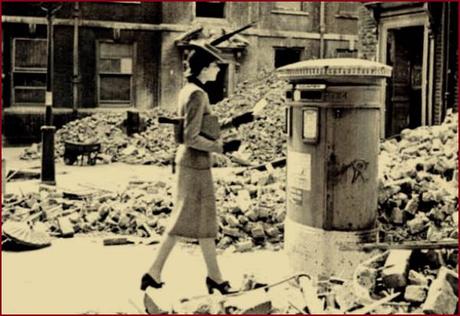The difference is a subtle one, perhaps, the Greek phrase suggesting gamely that everything is to play for, whereas the cast of the Latin version is more fatalistic with a hint of predestination.
All stem anyway from the ancient game of dicing, a metaphor itself for the role of chance or randomness in our lives and destinies, where the tumbling roll of the dice (plural, die in the singular) is used to determine an outcome, a winner, a loser, one chance in however many sides of the dice there are: 6, 12, 18. 24, 30 et cetera.
Anyway, you know all that and I'm not going to burden you with a long blog on this rather wet and miserable August Saturday night. Instead we'll cut right to the poem, which I think fits the theme because it commemorates a somewhat fateful and random event. It's another in my occasional series of poems about Blackpool. This one is part history, the other part possibly being urban myth.
There was a strong and widespread rumor that Adolf Hitler had a soft spot for Blackpool and intended to make it a rest-and-relaxation resort for the Nazi top brass once Germany had won the war. Consequently (as the legend goes) he ordered that Blackpool should be spared in the blitzkrieg he planned for British towns and cities in 1940.
Nevertheless, some incendiary bombs and a few high explosives were dropped in the Blackpool and Fylde area, resulting in 11 people being killed and 13 houses destroyed, statistics which pale into insignificance when compared to the devastation meted out to Manchester and Liverpool in the north, to Birmingham and Coventry in the midlands and of course to London,

The single most deadly event, and the only direct hit on the town of Blackpool itself, came on the night of 11th September 1940. Walter Dutton, lift man at Blackpool tower, witnessed a single German aircraft breaking ranks and swooping to drop a 500lb high-explosive bomb onto Seed Street, near Blackpool North station. 8 of the eleven people killed and all 13 of the houses destroyed in the statistics I quoted above were accounted for by that lone rogue strike. Here is the poem as it emerged dusty from the imaginarium.
The Seed Street Bombing
Don't hit Blackpool! Thus spake The Fuhrer
to his air commandant, an emphatic injunction
from the man with a plan in the summer of 1940.
In his vision, our golden sands were destined to be
a favoured playground for German High Command,
with swastikas fluttering in the bracing sea breeze.
I was only a lad then, when Jerries' death hornets
came winging in deadly waves, night on night,
to soften us up quickly for invasion or surrender
by bombing holy shit out of cities like Liverpool.
I had a compunction to sneak out and watch
the Dorniers and Heinkels overfly in formation,
unrelenting hundreds, high up by the moon.
They used our tower to help point the way.
Their bombs turned the sky red over the Mersey
till you could hear dull thunder on the wind.
Everyone on Seed Street said Fuck Hitler,
we're a proud nation, we'll never bloody give in.
Of course I was worried. I didn't know about
the Luftwaffe's orders to pass Blackpool by,
to leave us unscathed in the push for victory.
I was only a lad. Don't hit Blackpool! I prayed,
and yet some bastard did just that! One rogue pilot,
one 500-pounder and my home and family were gone
in the instant of that single destructive act of war;
yet we who lived to mourn the eight who died
on the night of the Seed Street bombing can find
no comfort in the cock-up theory of history that says
it was all mistake. Those who remember now are few.
There's no plaque, there's not even a Seed Street anymore.*
*For those of you who are interested, the town center Sainsbury's supermarket stands on the site where Seed Street used to be. The only reminder that's left is the small car-park between Sainsbury's and the Ramsden Arms, which is still called Seed Street car-park.
Thanks for reading. Keep on rolling, S ;-) Email ThisBlogThis!Share to TwitterShare to Facebook
Reactions:
